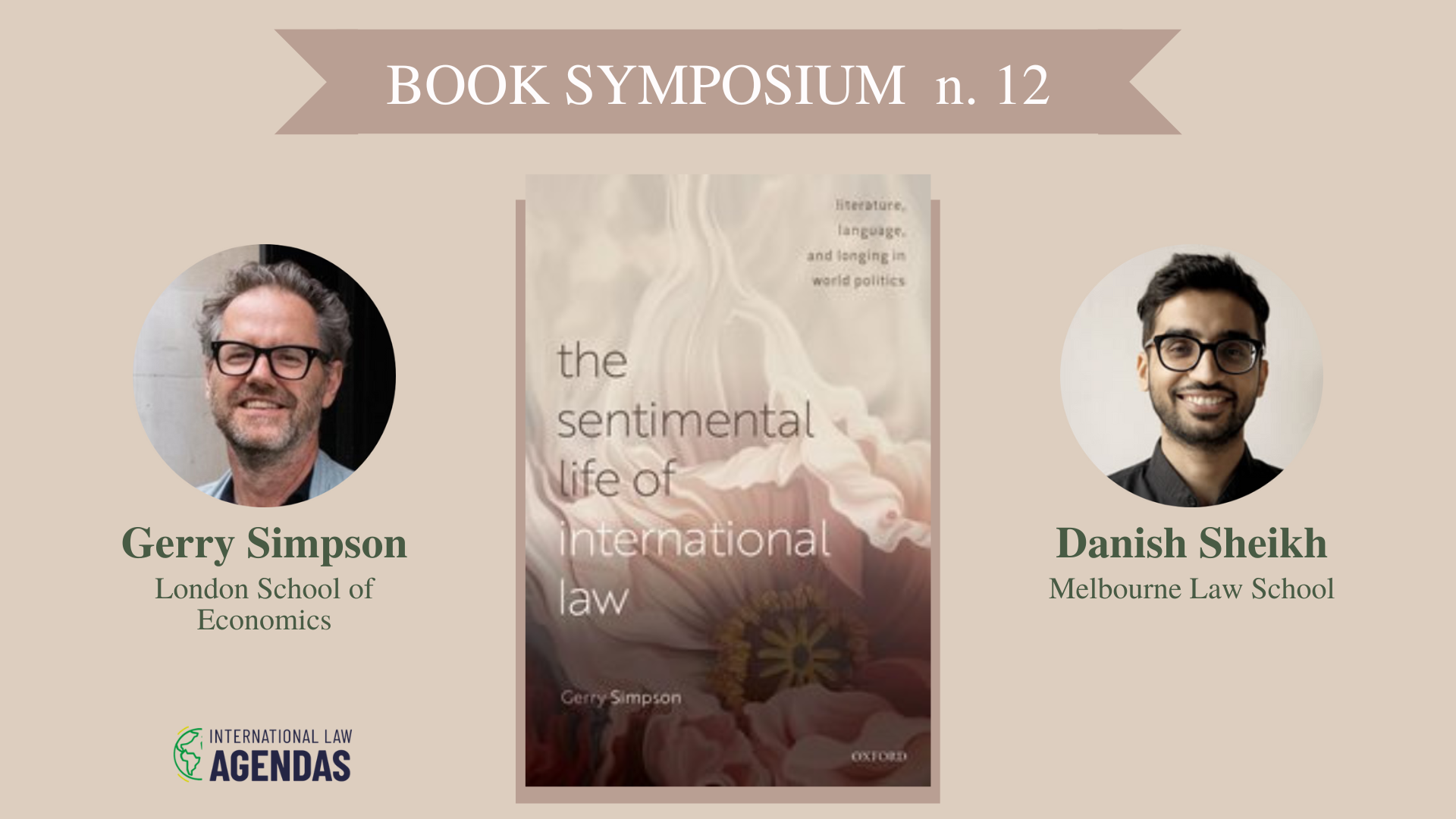There is one way in which Gerry Simpson’s The Sentimental Life of International Law: Literature, Language and Longing in World Politics is a very difficult book to describe, let alone review. This has something to do with how Simpson brings poetry into a relationship with the writing of international law. Simpson considers, first, that philosophical-juridical thought begins with poetry, with a metaphorical thought that we then labour to translate into a rational intervention. If this initial poetic impulse is subsumed by the tone of reasonableness that permeates scholarly writing, there is a second sense in which such writing takes on a poetic quality. Poetry is non-fungible – to paraphrase a poem is to lose its meaning which is inseparably attached to its form. Poetry is also impossible to translate in one sense, with the only truly effective translation being one that creates an entirely new object. Scholarly writing has a similar attribute, suggests Simpson: “Our sense of what a piece of international legal scholarship or teaching has achieved is bound up with a sense of its literary style”(19). This commitment to content and style, he goes on to note, is what renders unsatisfactory the descriptions “of our own work or the work of people we admire” (19).
Here then is my opening quandary – how to describe the texture of this book without reducing it to the kind of unsatisfactory, affectless simmer against which it ostensibly writes?
One way to meet that dilemma is to read it with Simpson’s own slanted approach to his chosen texts. Two interrelated Freudian insights inform his reading: one that allows the unconscious to reveal itself through “indirection, error, quip, pun, juxtaposition”, another that attempts a playful bricolage, joining materials that do not appear to have any obvious relation (10,11). “Tell all the truth but tell it slant” is the Emily Dickinson verse he calls upon, and performs. Slantwise, then, I read Sentimental Life as a dictionary. In particular, I received it as a dictionary of affective idioms for international law: a catalogue that includes such delightful turns of phrase as “lawful sleepwalking” and a “meandering, subtle legal diplomacy”, that models “speculative hopefulness” alongside a “kind-hearted scepticism”.
What do these minor acts of invention make possible?
Simpson ruminates on the imaginative possibilities of international law in terms of its vocabulary: “… though it may be the case that we can do anything with words, there are only a very small number of words that we can do anything with” (200). One way to deal with this vocabulary-limitation, one way to “open up the space in which international lawyers can live and work” (3) might be through furnishing a set of vocabularies that allow us to describe the moods-feelings-emotional atmospheres of international law. The idioms that Simpson provides us with do just that. As with Lauren Berlant’s cruel optimism, an affective state that he refers to early on, the idioms point to referent emotions that are not immediately obvious, that require an involved explication.
To name and describe these affective states is to engage in minor acts of invention; to deploy them is to open up a range of playful possibilities for the reading and writing of international law. Two striking examples: First, in Nikita Khrushchev’s letter to Fidel Castro following the Cuban Missile Crisis, Simpson describes the meandering, poetic style with its invocation of time and land as a form of “pastoral international diplomacy” (211). Here the idiom of pastoral diplomacy renders significant a set of seemingly quotidian details in the letter. Its preambular musings on the changing seasons in Russia are not a mere aesthetic adornment – they are part of the diplomatic work. Another notable example: when the ICJ attempts to reduce the ungraspable immensity of nuclear war into a legible lexicon, Simpson describes the opinion as a form of lawful sleepwalking (72). In this case the idiom asks us to pay attention to the tonality of the decision, the ironic gap that results from international law’s attempts at administering that which cannot be administered.
Through his writing, Simpson models an alternative to both a lack and excess of sentiment in international legal writing. On the one hand, he notes, there is a disembodied inclination, where the writer expresses themselves in a highly contingent, depersonalised manner. Counter to this is a whole-hearted plunge into the terrain of the sentimental which comes with its own dangers: “excess, simplicity, solipsism and depoliticisation” (53). What then? Not too sentimental, not too little, Simpson’s Goldilocks temperature of sentimentality is “a sort of hard-boiled, unillusioned sentimental life … sentiment without sentimentality. A sentimental life that takes the emotional pulse of the work we do but allies it to an economy of irony that is at the same time detached but involved”. (53) These contradictory impulses, little internal tugs of sentiment, gentle acts of line-walking, are the stuff of this book, its content inseparable from style.
Modeling this form of sentiment without sentimentality, Simpson signals us towards an ethics of noticing: of noticing intuitions and comportments, of naming and describing and therefore valuing them, of giving them life. Familiar stories become strange, tiring debates are revitalised. See, for instance, the segment where he goes on to note the shared aesthetic predispositions and tonalities that might bring together writers of international legal history, divided as they might otherwise be by questions of method:
“what lies beyond method that makes a particular piece of history or legal scholarship attractive to us? The simplest way to put this is to say that when I read international law or fiction, or watch a film, I quite often have a sense- sometimes within minutes – that I am in good or bad hands. And a consideration of this sense cannot be exhausted by an attention to method (or ‘method’ does not seem quite the right word to capture our intuitions about these things, or if you like, our intuitions about intuition)” (117)
I would like to close out my response by holding on to this particular account of intuition in the book, and bringing it in relation with the writing-as-poetry account with which I began. There, I noted how Simpson describes the poetic quality of scholarly writing in terms of difficulty: the difficulty that would arise with attempting to adequately paraphrase a piece of work where the style is inseparable from its content. The poetic quality there becomes an impediment for the person attempting to describe the scholarly text in question. In marked contrast is the almost ineffable “sense” that Simpson points to in the extract above, the sense of attuning to a piece of scholarship, a sense that exists on a similar spectrum to the sense of attuning to a piece of art. This too is a poetic quality, but it swaps the precision of the prior example for something more capaciously diffuse. Here it is the cultivation of a poetic sensibility that allows us to attune to a particular piece of scholarship. It recalled for me – no, it rhymed with (to stay within the idiom of poetry) – an approach styled by Anne Carson. In her prose-poem, Merry Christmas from Hegel, Carson’s narrator sits in their armchair, reading Hegel on a wintry Christmas morning. They speculate on Hegel’s account of speculation, “being the proper business of philosophy”; they watch as Hegel’s words drift “in gentle mutual redefinition of one another”. Then, wretchedly lonely, in an attempt to put on the mood of this writing, they walk outside to stand in the snow, performing their own minor act of speculation. The narrator notes that their speculative account is not something that Hegel would recognize as his own. It is, however, an account that would not be possible without attempting to inhabit the mood of Hegel’s writing.
To linger within the space of our intuition and find within it valuable resources; to cultivate our poetic sensibility as a method; to find ways of inhabiting the mood of international law: these, finally, are some of the modes of living with international law I suggest Simpson opens out with this generous book.
-

Danish Sheikh is a PhD Candidate at the Melbourne Law School and a member of the Institute for International Law and the Humanities.





